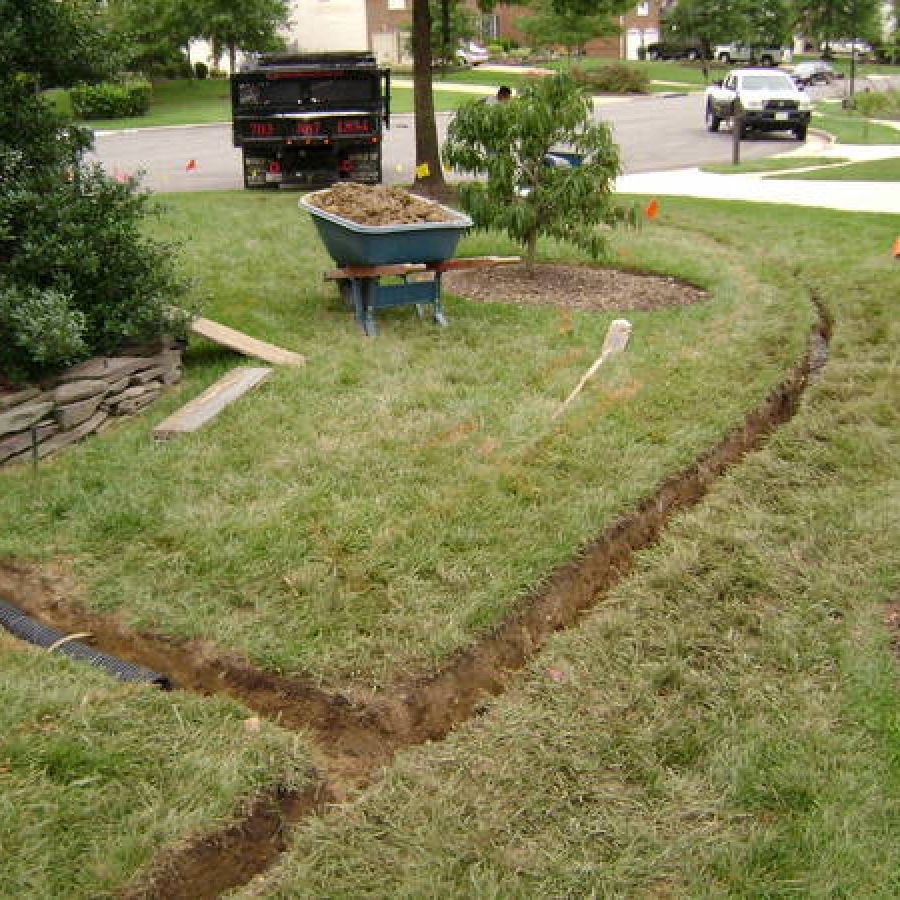Symptoms of Poor Drainage in Cobb County
Don’t let standing water prevent you from enjoying your Cobb County property
Standing Water: If large puddles remain on the lawn more than 45 minutes after a rainstorm ends, your yard probably has a drainage issue. Standing water provides a perfect breeding ground for mosquitos and can also suffocate the sod underneath.
Poor Lawn Health: If the lawn seems unhealthy even though it’s getting regular water and sun, or if some patches of grass are dying for no apparent reason, it’s likely that your Cobb County yard is not draining properly.
Water Flowing into your Cobb County House: A drainage problem can result in water from the yard seeping into the home. Wet floors around the doors, water stains in the basement, and cracks in the foundation are some typical symptoms of water intrusion.
Issues & Solutions
Causes of Poor Drainage on your Cobb County property
Most Cobb County drainage problems result from improper grading. In general, a properly graded Cobb County yard should slope gently downward from the house and toward the street. Many properties are not properly graded, and water gathers in the yard’s low spots. Yards that were once properly graded can develop problems as the roots of trees and bushes create natural dams by raising the soil. Poorly executed Landscaping projects can also alter the grade of the property and create low spots.


Potential Solutions for your Cobb County home
French Drains: Named for their inventor, Henry French, French drains are subsurface drainage systems that remove water from waterlogged ground. A French drain consists of a perforated pipe surrounded by gravel and kept free from dirt by landscaping fabric. Water seeps through the earth, gravel, and fabric to enter the pipe through the perforations, and the sloped pipe carries the water to a discharge point.
Surface Drain Systems: Surface drain systems are made up of several drains installed at the lowest points of your Dunwoody yard. Each drain includes a grill that covers a catch basin with a five- to ten-gallon capacity. Sloped drainpipes with four- or six-inch diameters connect to each catch basin and then lead to either a collections point with an automatic sump pump or a discharge point near the curb. A sump pump is used when the catch basin is lower than the street.
Dry Wells: A dry well works much like a French drain, but instead of carrying water to a municipal storm drain, your Cobb County home’s drains and downspouts direct water to a buried storage tank that gradually releases the water back into the groundwater table. Dry wells are a cost-effective eco-friendly alternative to traditional drainage systems.
Swales and Berms: A swale is a shallow ditch with gently sloping sides, often filled with rocks; berms are raised embankments of earth. Swales commonly incorporate boggy areas or water-loving plants. Both swales and berms must be carefully designed to effectively move water away from your Cobb County home.

Get Started on Your Project!
Fill out the form below to contact us and discuss your next project or give us a call at: 470 523-3742

